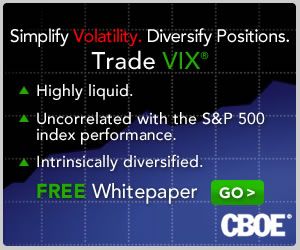VIX Sets New Record with Nine Up Days in a Row
Over the
course of the past few days I have been tracking the slow grind upward in the
VIX on Twitter, noting that it had
been up seven, eight and eventually nine (as of Friday) days in a row. As the VIX is a mean
reverting animal, I find it interesting that until Friday, the VIX had never
risen for nine consecutive days in 27 years of VIX data. Perhaps even more interesting, during the
same period, the VIX had fallen nine days in a row on nine separate instances
and even managed to fall ten days in a row on three occasions. For those who may be wondering, this is yet
another data point supporting the idea that VIX mean reversion is more robust
following a sharp VIX spike than a sharp VIX decline.
Whenever
the VIX makes an unusual move, I am bombarded by variations along the lines of, “That’s
nice, but what does it mean for the markets?" As much as the doomsayers hate to hear this, fear is almost
always a great fade, particularly when you have a little patience. Rather than talking about the matter in
theoretical terms, however, I thought I would let some numbers do the
talking. In the table below, I have
assembled the fifteen instances in which the VIX has been up at least seven
days in a row and have calculated the mean and median performance in the VIX
for seven different intervals ranging from one day to 100 days.
[source(s): CBOE, VIX and More]
Not
surprisingly, the mean and median performance of the VIX following these 15 streaks and 1-100 days is uniformly
negative. The data set includes data
from Thursday and Friday, which show increases in the VIX and render the one-day
performance relatively weak when compared to the rest of the measurement
periods. That being said, mean reversion
is evident from the first day all the way through the five-month period that
forms the most distant measurement date in this table.
Once again,
these findings are consistent with dozens of similar tables presented in these
pages over the years that show fading a VIX spike is,
on average, an excellent trade opportunity, assuming elevated levels of volatility will
persist.
Returning to theoretical territory, if you think about it,
what is the type of environment that is likely to cause the VIX to move higher
every day for a week and a half or so?
Typically it is event
risk in the form of a known event on the calendar that investors
obsess about and become increasingly anxious about as it draws ever nearer. Think of Fed meetings (The
VIX and the Pre-FOMC + Post-FOMC Trades), Greece’s elections
or key Parliament votes, Congressional votes related to the fiscal cliff,
etc. [See A
Conceptual Framework for Volatility Events for more background and
context.]
Contrast fretting about the scheduled event risk with
something that comes out of nowhere, like the yuan devaluation, Ebola virus,
Fukushima, various terrorist incidents and even the Arab Spring. These dark gray swans blindsided investors
and caused a sudden sharp VIX spike – the kind whose steepness cannot be
sustained over the course of 1 ½ weeks.
A Twitter reader asked about volatility
crushes and their timing. In a
nutshell, a volatility crush is the opposite of a volatility spike and
generally happens after a scheduled event is over. In addition to the macro events listed above,
one often sees a volatility crush following an earnings report. For reasons discussed in A
Conceptual Framework for Volatility Events, a volatility crush is much less
likely to occur in the context of an unscheduled event with no notice and an uncertain duration.
Today we saw an excellent example of a volatility crush
following the announcement by James Comey that the recently discovered batch of emails contained no new evidence in the Hillary Clinton private
email server case, reaffirming that there would be no criminal charges against
Clinton. Front month (November) VIX
futures are down 12% on this news.
For those who
may be interested, you can always follow me on Twitter at @VIXandMore
Related posts:
- Event Risk, Event Theta and the Next Week
- Guest Columnist at The Striking Price for Barron’s: How to Trade Options Around Volatile Events
- Volatility Becomes Unhinged on Friday
- Fukushima Daiichi and ‘Event Theta’
- The VIX, Lehman Brothers, and Forecasting
- The VIX and the Pre-FOMC + Post-FOMC Trades
- Greek Elections and the Future of the Euro
- Are You Watching Greece?
- Greece, Spain and the Pulse of European Anxiety
- A History of the VIX During Recent Debt Ceiling and Sequestration Battles
- VIX Narrowly Misses New Consecutive Day Decline Record
- Streaking
- Last Two Days Are #5 and #6 One-Day VIX Spikes in History
- Today’s 34% VIX Spike and What to Expect Going Forward
- 2014 Had Third Highest Number of 20% VIX Spikes
- All-Time VIX Spike #11 (and a treasure trove of VIX spike data)
- The Biggest VIX Spike Ever: A Retrospective
- VIX Sets Some New Records, Suggesting Volatility Near Peak
- Highest Intraday VIX Readings
- Short-Term and Long-Term Implications of the 30% VIX Spike
- VIX Spike of 35% in Four Days Is Short-Term Buy Signal
- Volatility During Crises
- Forces Acting on the VIX
- A Conceptual Framework for Volatility Events
Disclosure(s): the CBOE is an advertiser on VIX and More


